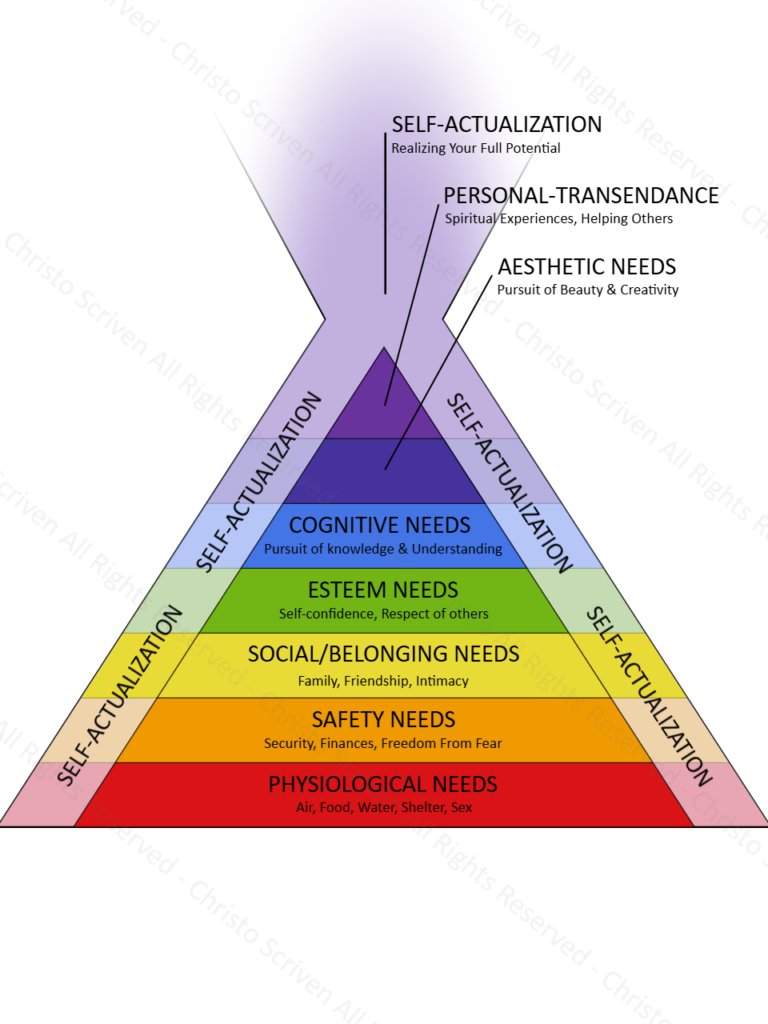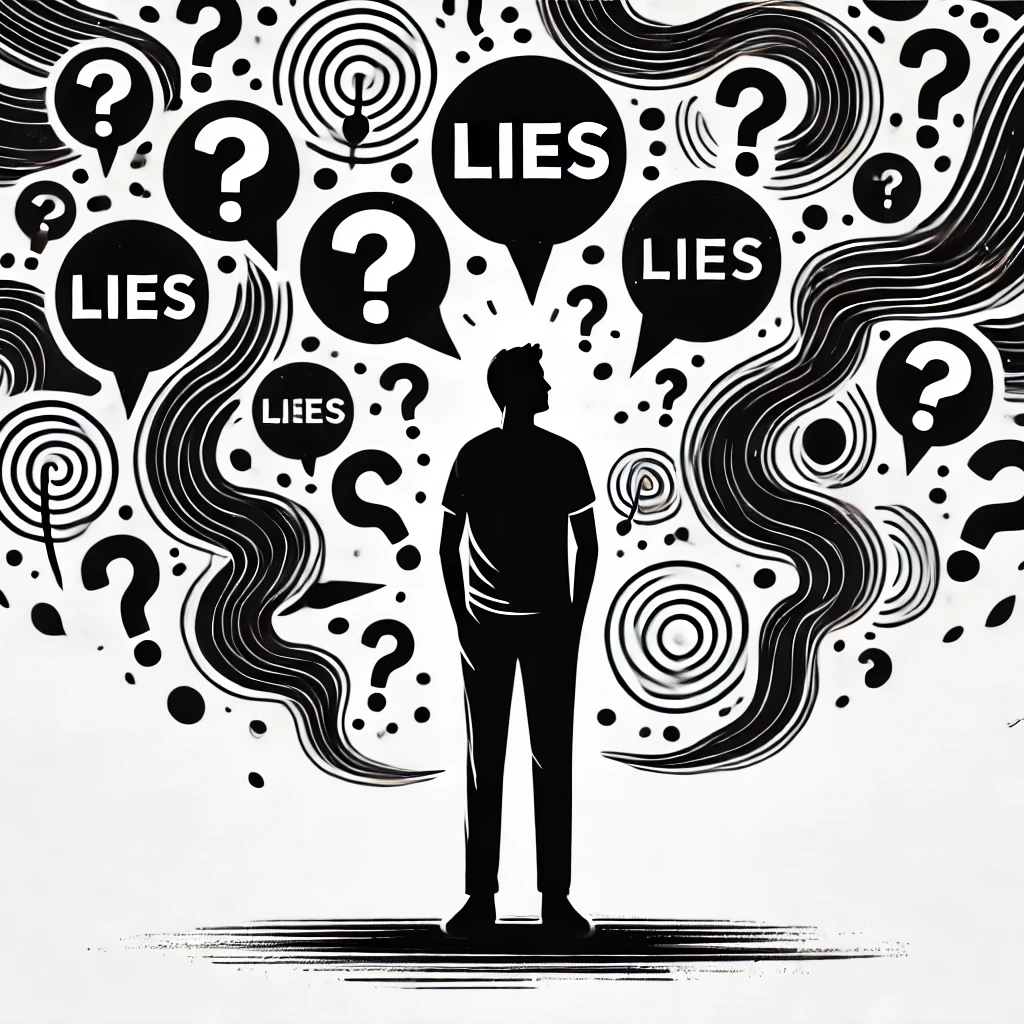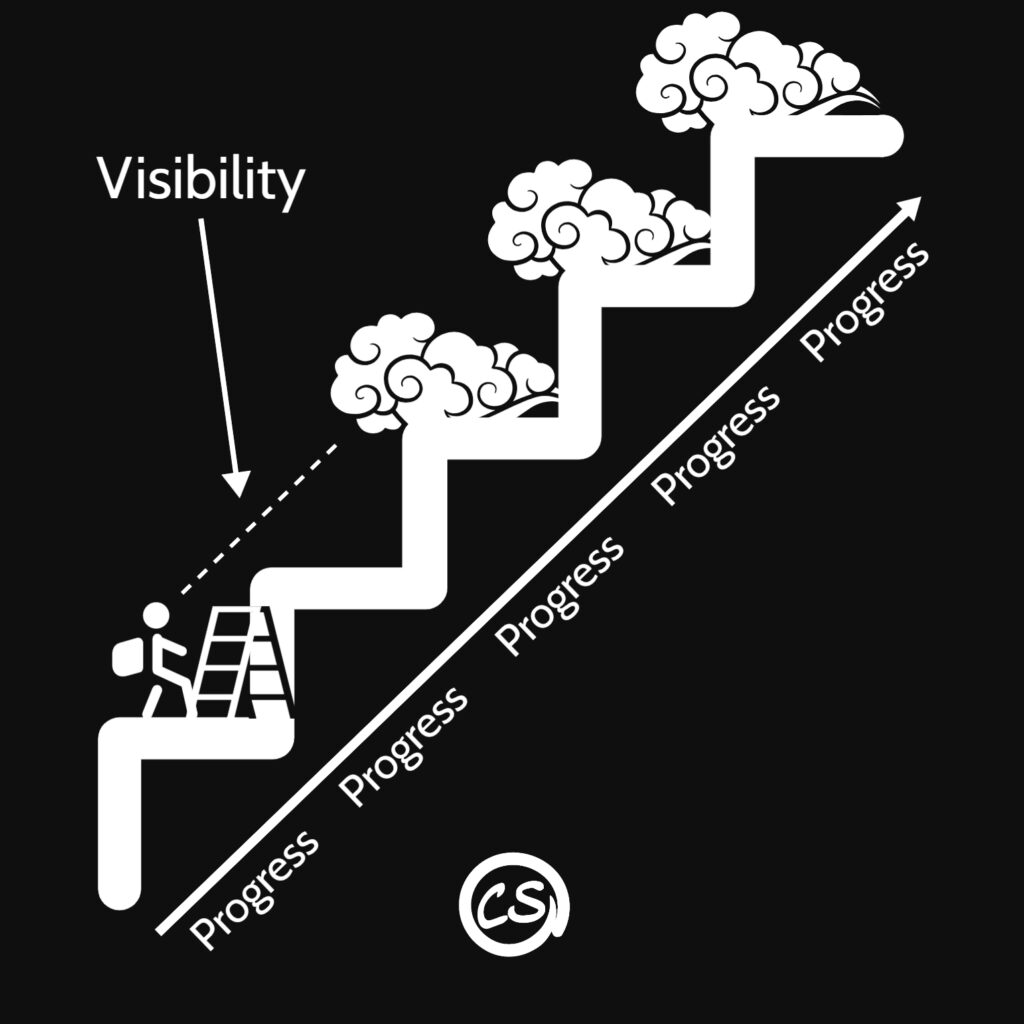Graphic of my new Hierarchy of needs can be found at the bottom.
before you read
Sign up to receive my writings straight to your inbox every Sunday, for free:
Most people know Maslow’s Hierarchy of needs with self-actualisation at the top as the ultimate peak or pinnacle.
What you may not know is,
Maslow later added another level to the hierarchy called “self-transcendence”.
He described this a focus on experiences and motivations beyond the self, such as helping others, experiencing a sense of unity with all life, and engaging in spiritual pursuits.
He also recognised 2 other levels under self-actualisation:
Cognitive needs. The drive toward knowledge, understanding, exploration, and mental stimulation.
& Aesthetic needs. The need for beauty, balance, symmetry, and order.
These additional layers add more of coloured perspective of the human experience, and asking ourselves whether we have met these needs for ourselves may be a doorway into a more fulfilled and meaningful life.
But something being helpful, and right, are different things, and if you continue reading, you’ll find out why Maslow was in fact, wrong.
Are you fulfilled?
I’ve often ask myself why I’m so obsessed with personal growth.
Out of many old friends that began this path with me, I’m the only one that continued to the extreme I have.
Perhaps it’s because deep down I feel like I’m not enough just as I am.
Or perhaps it’s because I had a deep realisation that the best way to live my life, is to completely fill my inner and outer potential in the best way I can.
Either way, here I am.
I don’t regret the path I’ve taken, nor do I ever think I will. And maybe being able to say that with certainty is reason enough to pursue this path.
——————
Over my journey, I’ve noticed this dance that occurs between the acquisition of these different needs within Maslow’s hierarchy.
For example:
The more self-actualised I become, the more easy I find it to express and explore cognitive and aesthetic pursuits. And certainly the more easy I find it to meet my lower level needs.
Also, the greater level to which I dive into self-transcendence (as Maslow termed it) work, the greater degree to which I feel like I am self-actualising. But there’s a tid bit to this:
I don’t understand how I am supposed to transcend my “self”, but also actualise my “self”.
You might say “it’s a paradox”, which I could be comfortable with, but I just find it nonsensical.
Especially when comparing it to other views on the self.
Then I consider my more lower level needs which relate to my real world commitments..
Like business, family, household stuff, and through what I’ve learnt over the years, I can’t help but frame these pursuits as a part (a significant part, at that) of me actually self-actualising my potential in the world.
So this lead me into the main points I want to cover here. Which will significantly change your view of Maslow’s hierarchy, forever.
Here are the main points:
- Self-actualisation isn’t a pinnacle.
- Self-transcendence is a fallacy.
- Self-actualisation occurs at all levels.
- Mind-bending bonus.
Self-actualisation isn’t a pinnacle.
You’ll never reach your potential, here’s why:
As time leads away into the future, the potential that it holds, opens up to become wider and wider.
Imagine one of those climate projection graphs.
Where the extremes of what’s possible spread out into the future if certain actions and taken or not.
Our own potential for self-actualisation works in the same way.
As time passes, the amount to which we can actualise our potential, fans out. Becoming greater and greater over time.
What does this mean?
The amount to which you can self-actualise now, isn’t the same as the amount you can self-actualise in 20 years time.
- More time allows for more possibilities,
- more possibilities expands out more potential,
- more potential allows for more actualisation.
So this bring into question:
Is self-actualisation a pinnacle that we can reach, or is it more of a field of potential that we fill?
If it is a pinnacle, when you look at a graph of potential fanning out into the future, where does that pinnacle occur?
- Is it when you reach your peak of biological growth in your late twenties and the bodies aging process starts to occur?
- Is it when you reach the peak of your career, where you’re making more money than you ever have, and have more powerful connections?
- Or is it when you retire, and you can enjoy your days with the stress of a career and spend many meaningful hours with your grandchildren?
- Or could it even be when you take your last breath?
Of course, the answer is, well, none of these, because actualisation is (like all reality) a dynamic flux, it’s a field of potential that can only be explored, never fully acquired.
You can never know the potential which you could have reached if you:
- Took that risk 15 years ago,
- Asked that person out,
- Didn’t make that wrong turn and miss that meeting.
And that’s ok.
Because our potential isn’t in the past, instead it stretches out in front of us, waiting to be actualised.
Self-transcendence is a fallacy.
Across many cultures and school of thought the “Self”, is seen as the most:
- fundamental,
- potent,
- sacred,
- and interconnect…
…aspect of the individual.
From Eastern religions and philosophies like Buddhism, Hinduism, Taoism & Sufism.
To western worlds views like Christian Mysticism, Neo-Platonism, Jungian Phycology and Transpersonal psychology.
The self is not seen as a limited, self-centred, or ego bound identity, but a profound and limitless essence that is connected to all things.
And in my experience, this is the case.
So, when Abraham Maslow added self-transcendence as the highest level of his hierarchy, I think he made a mistake.
The notion that you should transcend your “self”, really doesn’t make sense.
The self is the most intrinsic part of you, and many cultures view its full realisation as the highest possible goal.
Now you might be thinking this is just me picking up on the use of a simple word – which actually is the case (at least in part).
But when we’re talking about these deep/transcendental concepts. I think it’s important that we use words to identify and describe things in the same way others do, otherwise, we aren’t all on the same page.
For this reason, I think Maslow missed the mark when he dubbed the highest level of his hierarchy “self-transcendence”.
The self isn’t something you can transcend, it’s already the “highest” part of you, in terms of spiritual experiences, the Self is something you realise.
I think a much better term to use for this level of the hierarchy is “personal-transcendence”.
(Which is also the name of stage 4 of the Phoenix Growth Program).
This term much more appropriately reflects the the concepts of self-realisation and the like, which point to the letting go or dissolution of “ego” or “personal” based identification and consciousness.
Self-actualisation occurs at all levels
When you do the dishes, you’re self-actualising.
Let me explain:
The self is the most essential and limitless aspect of who you are.
Even if you aren’t aware of it, it’s aware of you. It’s aware of every one of your thoughts, emotions and actions.
I’m not going to stay that everything you do stems from the self, because that’s not true. Probably most of what you do stem from the personal or ego mind.
But here’s the goal: to make everything you do, an expression of the self.
How does this relate to doing the dishes?
Well, let’s say the reason you do the dishes is because:
- It increases your stress levels when there is mess everywhere.
- It’s inconvenient that when you make a meal, you have to clean everything up before.
- Your in laws come over every Tuesday and Friday to look after your kids (fair enough?).
Even if all these reasons are related to your ego or personal experience, it doesn’t mean they have no weight when you are acting from the self.
Self actualisation doesn’t mean meditating in a cave for 5 years – that will lead you to self-realisation and personal-transcendence.
But that’s far from being self-actualised.
If once you are self-realised, you go back to your normal life, but now with a completely different way of being, do you still do the dishes?
Absolutely!
Why?
All the same reasons as before!
But now you’re doing it from a place of higher awareness. Now, it’s an expression of the self. Or in other words:
Self-actualisation.
Mind-Bending Bonus
Is the story of the Buddha a story of self-realisation,
Or self-actualisation?
Maslow hierarchy of needs placed “self-transcendence” above self-actualisation.
But here’s a question for you:
How can you fully self-actualise, when you haven’t fully self-realised?
Maslow saw self-actualisation as a fixed end point that you could reach and embody consistently.
But in my view, that’s wrong.
And how he described self-transcendence suggests that he saw it as an ongoing, expansive process.
Wrong again.
When Gautama Buddha self-realised (or became the no-self) and reached nirvana. He was given a choice by the Gods there.
They asked him whether he wanted to stay in Nirvana with them, or go back to “reality” and help guide other souls to Nirvana.
His decision? Well, we wouldn’t have Buddhism if he decide to stay…
Here’s what this means:
Buddha chose self-actualisation over what Maslow called self-transcendence.
He decide to take the wisdom he had learned, and the truth he had experienced, and go and change the world with it.
He decide that self-actualisation was a “higher” need, than self-realisation.
Now let’s say if the Buddha succeeded in his goal and help every single person in the world reach nirvana, would he then be classed as fully self-actualised?
Or could there some other potential for him, that is yet known?
This is a question we will probably never have an answer to.
But personally, I get the sense that there is always going to be something more to do, some more potential that can be filled – our work will never be complete.
On the other hand, where Maslow’s concept of self-transcendence hints at a ever expanding, ongoing process, the story of Buddha contradicts this.
Once Buddha got to Nirvana, that was it, he was in Nirvana. That was the ultimate state to reach.
Not ever expanding, not ongoing or dynamic, but concrete, real, more real that the “reality” from where he returned.
So this is the mind-bending bonus:
Self-actualisation still sits at the top of the hierarchy.
But to fully self-actualise, you must transcend the personal.
What I call personal-transcendence (Maslow’s self-transcendence) is the penultimate pinnacle that allows full self actualisation to happen.
To Summarise:
Later in Abraham Maslow’s life he place the ultimate human need of self-transcendence at the top of his hierarchy but term self-transcendence is non-sensical—personal transcendence makes more sense because it ties into multiple schools of though about what the self actually is.
Personal-transcendence isn’t the ultimate need, as it’s a precursor to fully actualising the self into the world.
Self-actualisation isn’t a fixed attainable point, it’s an ever expanding field of potential they can only be explored, never really realised.
If you’ve found this read insightful, and you’d like to dig into the actual work of transcendence and actualisation, then you must check out the Phoenix Growth Program:
https://youtube.com/playlist?list=PLwBLZARvY7EbrehxNNiIGzvMLvlX64Yp_&si=Q-A9EdJhp_dZQv8j
If you want direct guidance and help with this work, then simple book a chat directly with me using this link:
https://calendly.com/christoscrivencontact/15-minute-chat


